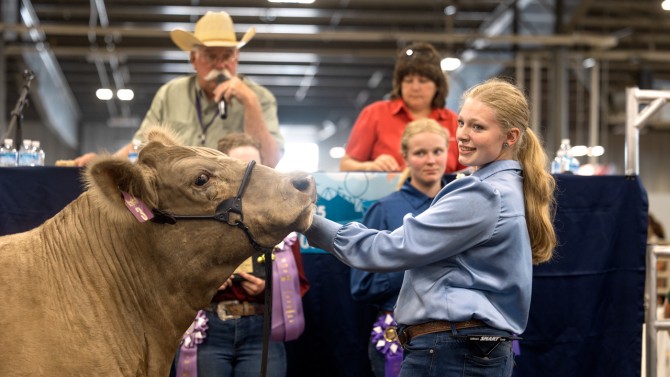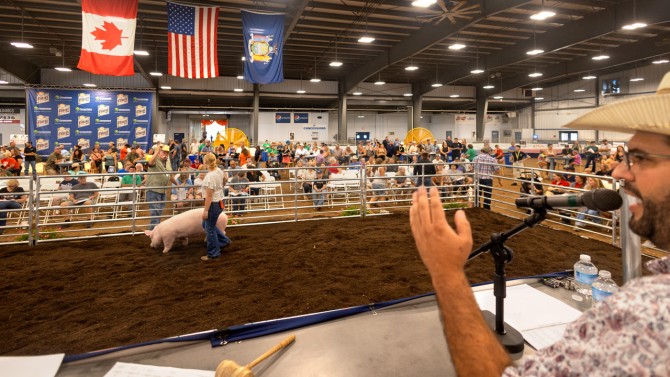As her 1,411-pound steer lumbered out of the auction ring, Jolene Mesch, 13, studied the crowd of bidders, looking for the man who had just bought her animal. She marched straight over to shake his hand.
"I know the effort and time these kids put in," said the buyer, David Knoll, of Hamburg, New York. "You're not going to get better quality elsewhere."
Mesch was one of 78 kids in the 4-H Livestock Program run by Cornell Cooperative Extension (CCE) of Erie County. The program culminated with auctions on Aug. 9 and 16 at the Erie County Fair in Hamburg, where kids in either 4-H or Future Farmers of America (FFA) sold the chickens, rabbits, turkeys, hogs, lamb, meat goats and steers they raised this year.
A long-time tradition in the farming community, the auction enables bidders to purchase the animals for meat, usually at a significantly higher price than the market rate. The youth use the income in a variety of ways: to cover the expense of raising the animal; to purchase next year's project animal; to pay for college tuition; or to start their own farm business. Many of the bidders represent local businesses connected to the agricultural industry, and many are lifelong 4-H supporters.
Leslie Mesch, 16, auctioned of her 1,328-pound steer as her sister Jolene Mesch looks on.
However, a few years ago, organizers noticed the number of bidders dropping, leading to less competition and a lower price per pound.
They added lessons in marketing to the livestock program's curriculum, which fit the 4-H mission of youth development through hands-on learning.
Along with learning about animal husbandry and building a budget, the kids in the program develop a marketing strategy for each animal. In a series of three workshops, they learn how to approach potential buyers, craft a two-minute sales pitch, write letters and create pamphlets. The program hosts the 4-H Livestock Auction Round-up Dinner in the spring, where kids do a "speed dating" exercise to talk to bidders and practice public speaking. In July, they participate in one-on-one interviews with potential buyers - not just answering questions about the animal, but explaining what they will do with the proceeds from the sale, their goals for the project, any plans to show other animals at the state and national levels after the county fair and a bit about themselves.
"The marketing program has helped," said Tammi Kron, 4-H youth development educator with CCE Erie County. "Prices have been increasing. The kids present themselves so well."
This year, the auction grossed $426,565, with 104 winning bidders purchasing the 170 animals up for sale. Of the bidders who registered, 54 were new to the auction. In comparison, last year's auction grossed $404,173, with 84 winning bidders purchasing the 210 animals up for sale. Of all registrants, 31 bidders were new.
Volunteer auctioneers sold the hogs, lambs, goats and steers to the bidders in the crowd at the Showplex building at the Erie County fairgrounds.
JoAnn DePue, a 4-H volunteer and an administrator at a nearby public school, has been part of the team that's building the marketing side of the program.
"It's a lot about relationship and making connections with people," she said. She encourages the kids to push through any shyness and reach out to potential bidders multiple times, sending updates and reminders.
Everett Gernatt, 11, of Collins, New York, said the program made it easier to approach people to tell them about himself and his steer, a Maine-Anju Angus cross named Thunderhead.
This year, one potential bidder asked to hear his sales pitch via Zoom.
"That was challenging," he said, but he thinks he made a good impression.
For the Mesch family, the livestock program and showing their animals is a centerpiece of their summer. Jolene and her sister Leslie, 16, each raised and sold a hog and a steer this year, and Jolen's twin Loraina, 13, raised a steer. Their older brother Justin, 18, finished his tenure in 4-H this year. They help their parents, Lisa and Jason Mesch, run their family's second-generation dairy farm in Collins.
Leslie Mesch says the program is helping her prepare for college and the workforce.
Everett Gernatt, 11, at right, holds a board used to herd hogs into the auction ring. The kids in the 4-H Livestock Program help run the auction.
"Most kids don't know how to do an interview," she said, "but every single year, we have to do an interview about our projects and answer questions about our break-even price and what we feed our market animals and if our plans worked."
Cold-calling businesses looking for bidders is intimidating, but it has gotten easier with practice, even if it's discouraging to be turned down, she said. The sisters have had a few disappointing days of phone calls.
"As a parent, you're in the background trying to cheerlead them on but also let them experience the disappointment," Lisa Mesch said. "It's all part of the process."
Knoll, who runs BGDK Show Pigs in Hamburg with his sons, said he purchases animals because it supports the youth in his farming community. He sees how the program instills confidence and encourages personal interactions with bidders.
"I appreciate that they send a handwritten note and they take the time to contact me before the fair," he said.
The livestock auction is becoming a family tradition for Tim Kuhn, of Hamburg. After purchasing a lamb last year, the 4-H participant he bought it from invited him again and sent him a flyer. Kuhn returned from a trip out of town early to attend this year and purchased two animals.
"I like meat," he said, "and it helps the kids."










